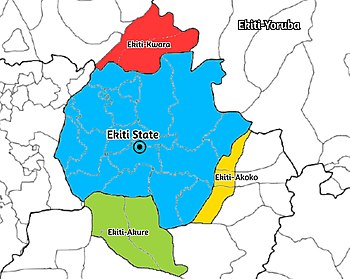 Territorial expanse of The Ekiti Yorubas.[1] | |
| Total population | |
|---|---|
| ~ 4,175,608 (2011-'16) | |
| Regions with significant populations | |
| Ekiti State - 3,270,798 (2016)[2]
Ondo State - 775,420 • Ekiti: 63,200 • Oke Ero: 66,190 | |
| Religion | |
| Primarily: Christianity Also: Islam • Yoruba religion | |
| Related ethnic groups | |
| Ìjẹ̀shà, Ifẹ̀, Ìgbómìnà, Àkókó, Yàgbà, Ondó, Other Yoruba people |
| Part of a series on |
| Yorùbá people |
|---|
 |
The Ekiti people are one of the largest historical subgroups of the larger Yoruba people of West Africa, located in Nigeria.[3] They are classified as a Central Yoruba group, alongside the Ijesha, Igbomina, Yagba and Ifes. Ekiti State is populated exclusively by Ekiti people; however, it is but a segment of the historic territorial domain of Ekiti-speaking groups, which historically included towns in Ondo State such as Akure (the current capital and largest city of Ondo State), Ilara-Mokin, Ijare, and Igbara-oke. Ogbagi, Irun, Ese, Oyin, Igasi, Afin and Eriti in the Akoko region,[4] as well as some towns in Kwara State, are also culturally Ekiti, although belong in other states today.[5]
The name Ekiti is a derivation of an earlier term, Okiti, which means "Hilly" in Yoruba, as characterized by the generally hilly terrain of the areas which the Ekiti inhabit.[6]
- ^ "Yoruba subgroups". Cambridge.org. Retrieved October 28, 2021.
- ^ "National Bureau of Statistics | REPORT DETAILS". Archived from the original on 2016-12-20. Retrieved 2016-12-10.
- ^ "The World Factbook — Central Intelligence Agency". www.cia.gov. Retrieved 2018-06-12.
- ^ "Akoko Resistance to External Invasion and Domination in the Nineteenth and Twentieth Centuries" (PDF). rsisinternational.org. Retrieved October 30, 2021.
- ^ "The formation of Yoruba Nation and the challenge of leadership since Pre-Colonial Era, Pg 14". research gate.net. Retrieved October 30, 2021.
- ^ Johnson, Samuel (1921). The History of the Yorubas. Cambridshire, England: Cambridge University Press. ISBN 9780511702617.
